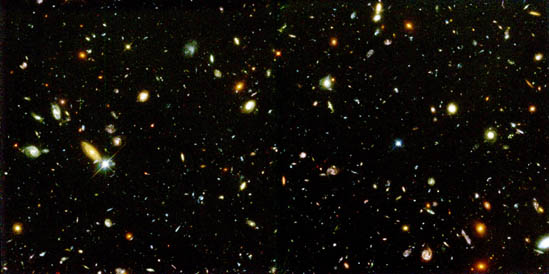Mick in England said:
Anybody know whether scientists have decided if the universes expansion is slowing down or speeding up?
For years they said it was slowing, but now they're saying its accelerating, I wish they'd make their minds up

This was published in January 2004
http://www.fnal.gov/pub/ferminews/ferminews04-01-01/p5.html
It's a mystery
Simply put, dark energy is a mystery. The expansion of the universe is accelerating, and theorists believe that dark energy is the driving force behind it. Evidence shows that dark energy makes up approximately 70 percent of the universe, meaning 25 percent is dark matter and 4 percent is matter made of atoms.
"Dark energy is the most important problem and deepest mystery in all of science," Turner said. "We are talking about the expansion of the universe speeding up. Everyone understands that it should be slowing down because of gravity. What is going on? The simple answer is that we don't have a clue and that is what makes this so much fun."
But what is dark energy? How does it behave? Why is it there? If dark energy is anything, it is the driving force that leads to questions with very few answers. And that is where Fermilab comes in.
[SIZE=-1]
The distant white dwarf supernova, SN 1997ff, exhibited less red-shift than expected, indicating that the expansion of the universe was speeding up.[/SIZE]
The Higgs, Supersymmetry, and Extra Dimensions
Both cosmologists and theoretical physicists believe that dark energy has a fundamental connection to particle physics. "Particle physics is all about understanding the fundamentals of matter, space, time and energy," Turner said. "Dark energy appears to be a fundamental feature of space."
But how can a particle accelerator help solve the mystery? Lykken believes that experimental discoveries of the Higgs particle, supersymmetry and extra dimensions may provide some clues about the physics behind dark energy.
"If the Tevatron were to discover supersymmetry (and there is a good possibility that it will), we would have a great chance to learn something about dark energy," Lykken said. "Dark energy is a very long-term project, and nobody said that understanding it was going to be easy. On the particle side, we need the Large Hadron Collider and the Linear Collider. New telescopes, such as Supernova/Acceleration Project's satellite telescope, are also necessary."
Turner agrees that accelerators alone cannot solve the dark energy puzzle. "We need both accelerators and telescopes," he said. "Accelerators can play a role by testing the role of supersymmetry, and telescopes can play a role by looking out in space and back in time to map out the expansion history, telling us how this cosmological speed-up occurred."
The Evidence
In 1998, a team from Lawrence Berkeley Laboratory, led by Saul Perlmutter, and a team of scientists from around the world, led by Australian astronomer Brian Schmidt, announced that the expansion of the universe appears to be accelerating. The two teams found that a distant supernova was fainter than expected, indicating that the expansion of the universe was speeding up rather than slowing down.
"We know that the expansion of the universe is accelerating," said Lykken. "But matter does not make the universe accelerate. It makes it slow down. There must be something else making the expansion speed up."
Since 1998, the number of observed supernovae has increased dramatically, and the evidence for dark energy has only gotten stronger. In February 2003, the Wilkinson Microwave Anisotropy Probe produced a map of the cosmic microwave background. The WMAP analysis indicates that atomic matter makes up 4 percent of the universe, dark matter makes up 23 percent, and dark energy makes up 73 percent. In October 2003, the Sloan Digital Sky Survey independently confirmed this data, bolstering the case for dark energy.
"This is all the smell of good science," said Turner. "Scientists always like to have independent confirmation of the same datathe more independent the better. Dark energy is not a discovery that is too good to be true."
Lykken added, "The Standard Model makes up only four percent of the universe, and those principles don't explain things like dark energy. There is a whole universe out there, and that's great. Instead of being an old science, we found out that particle physics is a new science. I don't know anybody that is resisting dark energy any more."
The Destiny of the Universe
Before dark energy, physicists believed that gravity would eventually cause the universe to collapse. Now that physicists know the universe is speeding up, the destiny question is wide open.
"If the universe continues to accelerate, its fate is not very attractive," said Lykken. "In the end, the universe will be dominated by dark energy, and we will all dilute away. I would like to find a much more disastrous way for the universe to end."
Turner agrees that if the universe continues to accelerate, its fate is bleak. "We will only see a handful more galaxies, which makes a great argument for funding astronomy now," he says. "It may not be possible in a billion years. On the other hand, the destiny question is wide open, and discoveries at Fermilab could change this conclusion."


